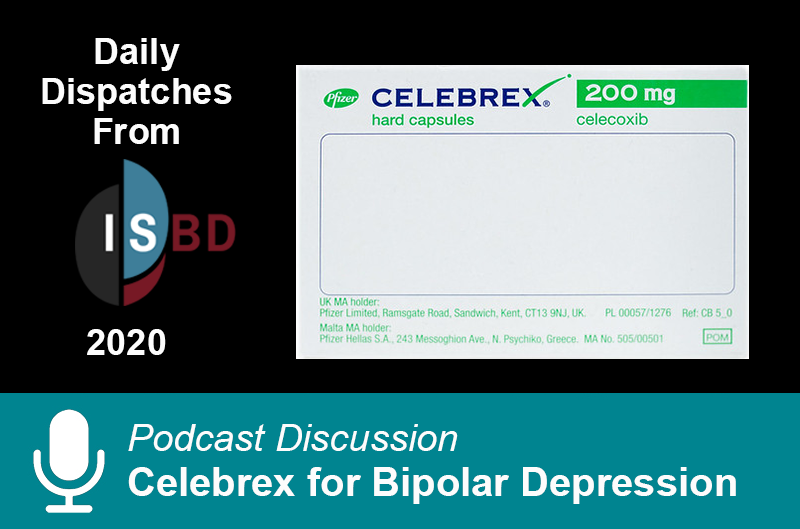Celebrex for Bipolar Depression
, Volume , Number ,
https://www.thecarlatreport.com/#

This week we’re podcasting from the International Society for Bipolar Disorders 2020 conference, where we’ve been scouring the virtual halls for all that is practical and newsworthy. The yield is high so tune in for a new episode every day. Today, new results on an anti-inflammatory medication in bipolar depression.
Published On: 7/1/2020
Duration: 3 minutes, 36 seconds
Transcript:
This week we’re podcasting from the International Society for Bipolar Disorders 2020 conference, where we’ve been scouring the virtual halls for all that is practical and newsworthy. The yield is high so tune in for a new episode every day. Today, new results on an anti-inflammatory medication in bipolar depression.
Welcome to the Carlat Psychiatry Podcast, keeping psychiatry honest since 2003. I’m Chris Aiken, the editor in chief of the Carlat Report. And I’m Kellie Newsome, a psychiatric NP and a dedicated reader of every issue.
Celocoxib – brand name celebrex – is a nonsteroidal anti-inflammatory with promising results in depression. Last year we ran an analysis of all the anti-inflammatory therapies in depression and this one came up on top with the best evidence. At this years conference Dr. Halaris and colleagues reported on a randomized controlled trial of celecoxib augmentation in bipolar depression.
They randomized 47 patients with treatment resistant bipolar depression to two groups:
escitalopram + placebo or escitalopram + celecoxicb 200mg bid
After 8 weeks, the celecoxib group had significant improvement. That result was already published, and in the conference they presented further data on biomarkers. Very few studies of anti-inflammatory medications in depression have actually analyzed inflammatory biomarkers to see if they improve with treatment or predict response.
Dr. Halaris’s looked at the most popular inflammatory biomarker, high sensitivity C Reactive Protein. Levels of CRP were significantly reduced in the anti-inflammatory group, but outside of that positive finding his other results ─ which looked at genes related to CRP ─ were only marginally significant with p values around 0.6
This week we are bringing you daily episodes, and if you’d like us to keep up this pace let us know by leaving a review in your podcast store.
Join us tomorrow for new data on an unanswered question: Can therapy treat bipolar II depression without help from medications? We’ll have more updates in our print issue, including unpublished results on a new medication for bipolar depression and a full review of the modafinils in bipolar disorder.
Got feedback? Take our podcast survey.




Leave A Comment
You must be logged in to post a comment.